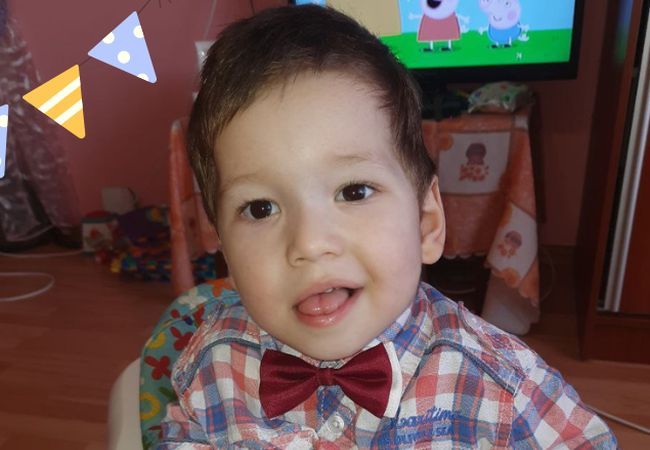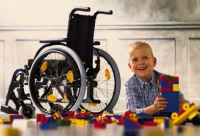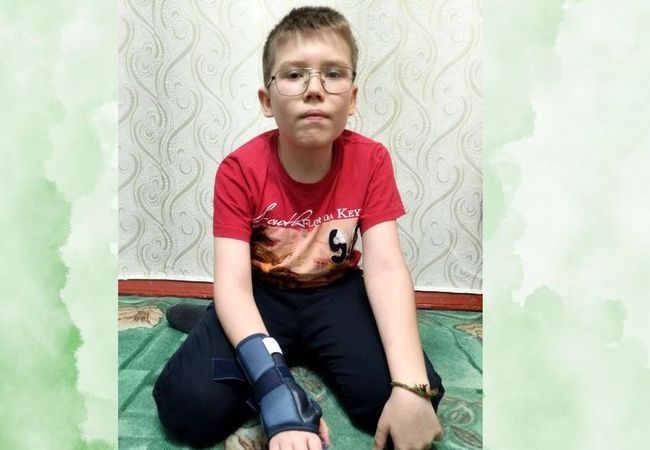
ŌĆ£ItŌĆÖs terrible!ŌĆØ This is the common reaction of people who come across childrenŌĆÖs cancer. Those who have read a corresponding article in a newspaper or on our website, or parents who find out about the cancer diagnosis of their child and sick children themselves, everybody reacts in the same way. Yes, oncology is horrible! ItŌĆÖs also time-taking and difficult. And one needs a lot of patience, faith and inner strength to bear it for months and sometimes years of treatment. And itŌĆÖs necessary to have somebody to turn to for help. Not all psychological problems can be solved by a person alone or with the support of friends and relatives. Sometimes it is really necessary to get help from a professional in the area ŌĆō a psychologist.
Since the very first days of the ŌĆ£Happy ChildŌĆØ Foundation when it was not a foundation yet but a group of volunteers managing deti.zp.ua website, there was a dream to find a psychologist for the ChildrenŌĆÖs hematology unit. We saw the unitŌĆÖs life from the inside. And we were aware how much psychological help was needed there, butŌĆ” no luck. We couldnŌĆÖt find people willing to work with those children. Once in a while there were volunteers but after a few visits to the unit everybody said the same phrase: ŌĆ£ItŌĆÖs terrible!ŌĆØ and disappeared. And when a year ago our colleagues from an initiative group ŌĆ£Dar YangolaŌĆØ (AngelŌĆÖs Gift) launched a project of psychological help to the kids with cancer diagnoses we were very happy! At last there was a qualified psychologist to work with children and their parents!
The project turned out to be very important and useful. Today I introduce Evgeniy Ryaboy ŌĆō he is the person who provides psychological help to the children of our Hematology unit.
- Evgeniy, my first question wonŌĆÖt be unique: Why have you chosen this professional area?
- When a teenager, I was very focused on my inner world. At high school I began to show interest in the nature of other peopleŌĆÖs emotional state. At first I learnt through classical literature, its characters and their sufferings. Later I began to read psychological and philosophical literature. During my last year at school I decided to take a preparatory course in psychology at the university. I was curious to see if the deep study of psychology would be to my liking. Those courses were very lively and fascinating (unlike the years of undergraduate studies that followed). I fell for the subject and understood I wanted to learn psychology.
- Did you want to understand peopleŌĆÖs nature first thing or your goal was to help people?
- Sometimes we talk about it with colleagues. And the majority of them including myself have chosen psychology studies to understand their own personalities first thing. By the middle of the studies I got a persistent interest in practical side, in giving consultations to people. And then I began to incline towards the area of clinical psychology. My final university paper was based on the research of psychological state of people with hypertension disease. I started to work with children mostly because during my work with adults I saw that many problems experienced by them had been following them since their childhood.
I wanted to research how the problems were formed and the methods to prevent their development in an early age. Besides, there is lack of clinical psychologists dealing with children. Even the system of academic education has a so-called ŌĆ£white spotŌĆØ, a gap in working with children suffering from serious somatic and psychic diseases. However it was of interest to me and now my work with seriously ill children and their parents is the primary task to me.
- Are you interested in this area because it is understudied?
- Right, it is understudied and there is a great need in studying it. For instance, the situation with childrenŌĆÖs cancer. While in the Western countries the area of psychological help to cancer patients is extremely developed and specialized undergraduate programs exist, in Ukraine there is a big gap in it. This is a very important direction but there is little information that is accessible, both theoretical and background as well as seminars and conferences on the topic.
- You have been dealing with children who have cancer for 14 months. Has it been difficult?
- I would say that in pediatrics children with cancer present one of the most challenging categories of patients.
- What typical problems that demand psychological help do you observe in your little patients?
- I think a nosogenic reaction is the most typical problem. These are desadaptative and very painful desocializing reactions to an illness. Cancer causes psychological trauma for a child. And the main problem scope of children of teenage and pre-teen age is presented by their worries and emotional instability, connected with the fact of an oncological disease. In our society these diseases are considered to be incurable, fatal. And in this situation a teenager who realizes that he or she has this very terrible, ŌĆ£incurableŌĆØ disease feels great anxiety with all the thoughts focused on the disease, obsessive thoughts about the future and about the unfavorable outcome of the illness. Very often these feelings become more acute on the eve of surgeries, before a chemo session.
The problems are also common after the intensive part of the treatment is over: when surgeries and chemotherapy are done but the teenagers still cannot get rid of their fears and return to a normal life. There are inferiority feelings, the fear that people around will treat them like disabled and the protest against limits that are experienced by the children who went through some treatment (limits on being in the sun, contacts with other people etc.). In my practice it is not a rare case when my function as a psychological support is not over with the end of intensive treatment of a child. We keep meeting after the child leaves the hospital and during his socialization stage as well.
- Is it possible to avert fear of death by concealing the real diagnosis from a teenager? Does this method help?
- It might help in some particular cases, but as a general practiceŌĆ” We are always curious about the unknown. And if this interest is not satisfied, it causes anxiety and fear. In my practice I came across the opposite situation: when adults tried to conceal the fact of childŌĆÖs death from the other kids in the cancer unit, it only provoked the interest to the case, and then ŌĆō anxiety, incomprehension of what had happened and what would happen to me. Moreover, in the situation when people around donŌĆÖt reveal the death case, the child not only suffers but is silent about his fears and thus aggravating his state of anxiety.
- ItŌĆÖs obvious that the cancer diagnosis and its treatment process are very stressful. How can one withstand and not be broken in this situation?
- ParentsŌĆÖ spiritual support plays a very important part. A child should be informed and educated about his/her disease and treatment. ItŌĆÖs extremely important to show him examples of positive outcome. Real life examples, not just those from TV and books. The examples of those children who underwent treatment in this very unit and successfully finished it. Usually it happens when the kids who finished treatment long ago come to the unit for a scheduled examination and share their experiences with the current patients. I observed the drastic state improvement in them after such meetings.
However sometimes it is necessary to turn to a psychologist. Often parents themselves are in a very difficult psychological state and cannot cope with their emotions on their own. And there are their childŌĆÖs emotions as wellŌĆ” And not always a family can cope with the problems efficiently. There are also topics that kids prefer to talk over with a psychologist, not with parents. And it also happens that after revealing the problem to a specialist, they open it to their family as well.
- What kind of questions do children with cancer prefer to discuss with a psychologist and not with their parents?
- ItŌĆÖs difficult to answer this question not violating my clientsŌĆÖ privacy. Generally speaking, these are the issues of fears and anger, irritation, dissatisfaction, including towards their parents sometimes.
- So if a child doesnŌĆÖt tell his parents about his emotions such as fear, anger etc., it doesnŌĆÖt mean he doesnŌĆÖt feel them?
- Sure. There are topics that we are not used to talk about even in the family circle, and sometimes a child is afraid of misunderstanding or condemnation.
- What can you say about the overall willingness of children and parents to collaborate with a psychologist?
- When a childŌĆÖs problems become obvious through his emotions or behavior and this is connected with his disease, then of course parents want to see a specialist to solve them.
- Well, the parents do, what about children?
- ItŌĆÖs not the same among children because often children and even teenagers donŌĆÖt fully understand who a psychologist is and what he will do. Sometimes when a child comes I have to explain that I will not do any injections and other medical procedures. As it happens that kids come to me with an expectation that it will be another doctorŌĆÖs examination with undergoing medical tests etc. Often a child, relieved after his visit to a psychologist, returns to the hospital unit and shares the impressions with the other kids. The latter can still be reserved and staying face to face with their problems, not willing to see a specialist because it is painful and frightening to talk about their fears. So the example of the kids who got relief as a result of psychological work sometimes incites the other children to come and deal with their fears. By the way, these cases were of big motivation and support to me during my first months of work in the hematology unit. Those patients, who were sent to me by doctors because of their emotional and behavioral disorders, were not always motivated to work with their problems.
- How often do adults turn to you for help? Parents of sick children?
- In my practice it happens in cycles. There was a period of time when parents showed a rather big desire to receive psychological help. There was another period when they didnŌĆÖt come at all. Perhaps they were not enough motivated. In my practice there also were cases when I worked with parents whose children died. More often those were the parents who turned to me while their child was undergoing treatment and after he died they kept coming but for a different reason ŌĆō to get over the grief and to go on with their lives.
- Can you recall the moments that made you feel your work provided real help to the children?
- Sure there were such moments. When a child comes (or is sent to me by the doctors) with a variety of psychological problems such as mood disorder, irritability, anger reactions, and after a long and painstaking work these problems are successfully solved, a child feels free from themŌĆ” And it is a pleasure to see such a result.
- Is it possible to solve all the problems of the children with cancer that you meet? Can a psychologist help in every case, always?
- Not always. For instance, when psychic symptoms are the manifestation of the very oncological disease (brain tumour, brain damage of leucosis patients etc.). In such cases it is impossible to overcome these symptoms with the help of a psychologist as they are the consequence of organic brain damage. And of course it is impossible to help if a child doesnŌĆÖt want this help. For example, in my practice there were cases when a teenager was talking to me about his worries and it was painful for him. And he refused to have further therapy in a fear that next time it would be as painful and that he would be made to undergo these trials again and again. In such a situation it can be extremely difficult to assure a child in the opposite, and sometimes even not possible. Unfortunately.
- And what kind of help can the closest people (friends, family) provide to a child with cancer? I mean psychological help
- When a teenager finds out about his/her cancer diagnosis, treatment process etc., he undergoes a range of psychological phases. During one of them he can be in the melancholic and cross mood: he doesnŌĆÖt want to talk to anyone, he can respond rudely to the phone calls or totally ignore his friendsŌĆÖ visits. Such episodes can be painful to the people around him, it seems to them they do something wrong and the child really doesnŌĆÖt need help. And when it happens it is extremely important for the family to understand that these childŌĆÖs reactions are natural for the given situation. And this psychological phase will pass and communication with friends will be very important for him or her again. In general it really helps when teenagers can communicate openly with their closest people.
Showing compassion and sympathy doesnŌĆÖt mean treating a teenager as somebody poor, doomed and almost perished. The phrases like ŌĆ£your diagnosis is horrifyingŌĆØ, ŌĆ£we worry a lot about you/are afraid for youŌĆØ etc. influent severely ill teenagers in a depressive way, they feel much worse after such words of ŌĆ£compassionŌĆØ. At the same time when people around are overcautious in communication and try to find the best words in order not to hurt a child, it is perceived rather painfully as well. The best way is to be simple and sincere in communication and to treat a child with the understanding that he/she is sick but is the same as before. This attitude helps a child a lot during the treatment.
I say it again ŌĆō the support of the family and friends is very important. And for both boys and girls itŌĆÖs important to have fatherŌĆÖs support. He should protect not only from the outer dangers, but also support a child in the inner emotional experiences that can be destructive sometimes. GrandparentsŌĆÖ involvement is also necessaryŌĆ” Generally speaking, the disease shouldnŌĆÖt trigger the change of childŌĆÖs surroundings and cause the change in closest peopleŌĆÖs attitudes to a child.
Unfortunately due to some organizational issues the group ŌĆ£Dar YangolaŌĆØ (AngelŌĆÖs Gift) cannot finance the project of psychological help to children with cancer anymore. At the same time we consider this project to be very important, thatŌĆÖs why we decided to take it over. To provide the Hematology unit with an adequate psychological service costs about 2000 hryvnyas (250 USD) a month. We turn to our donors with a request to support a project of psychological help to the sick children thus giving them and their parents a possibility to go through the most difficult stage of cancer treatment easier with fewer losses. You can get more details on this project and about how to support it from Iryna Gavrysheva. Contact details: phone +38 097 136 41 82, gavrysheva@deti.zp.ua, ICQ 339500957.



